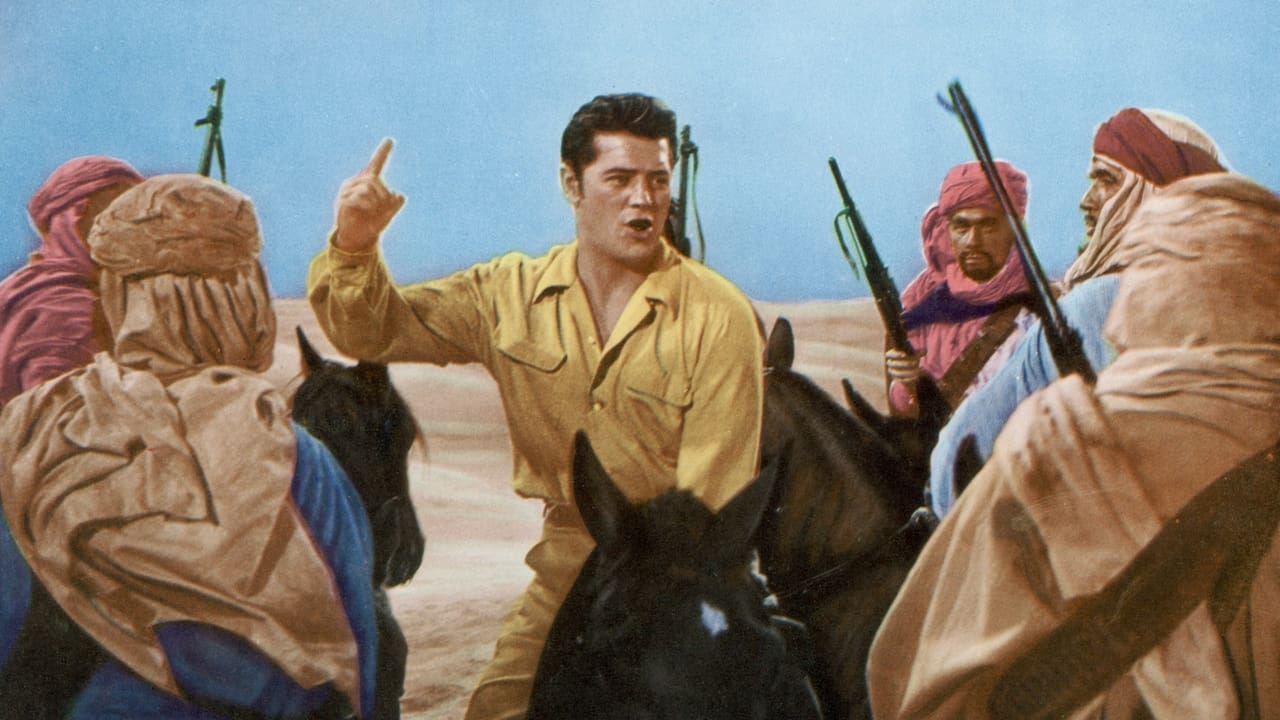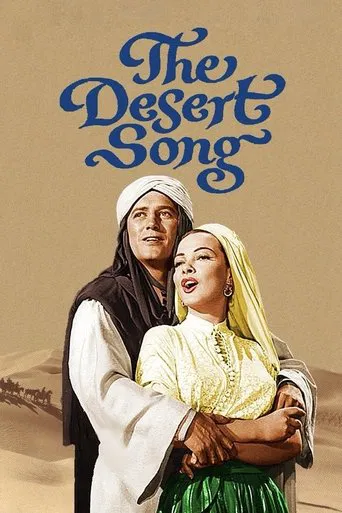

In this film, the highlights are the singing performances of Kathryn Grayson and Gordon MacRae. Unfortunately, the songs they sing are not really memorable. They certainly are not the quality of songs that you find yourself humming as you leave the theater. To make matters worse, these musical oases are separated by vast distances of desert-like story that are uninspiring.The tale that surrounds the music is about a tribal conflict in the Sahara and the political tensions between the locals and the French. A wily but deceitful sheik is portrayed by Raymond Massey. MacRae plays the good-guy-in-disguise Paul Bonnard, who moonlights as El Khobar--the mysterious opposition to Massey's plans.Comic relief is handled by Dick Wesson, but his performance is not very comic and it only intrudes on the real story.There is little to recommend this film, but fans of Grayson and MacRae will probably want to catch their performances.
... View MoreWith gorgeous music by Sigmund Romberg, lyrics by a variety of writers and its exotic setting, this fourth version of the 1926 operetta holds a special place in my heart simply because of how well it is sung. With gorgeous soprano Kathryn Grayson and baritone Gordon MacRae in the leads, the music is superbly recorded even if MacRae is miscast as a supposed Arab hero. While the 1929 film appears to be lost (or unavailable for viewing), a 1934 short ("The Red Shadow") and a 1943 remake are available. However, it is the last version of the film which has made it out onto home video, and it is definitely worth viewing simply for the lushness of its score, if not some of the uninspired casting.Other than his appearance in drag in "Calamity Jane", I never found anything amusing about Dick Wesson, and as MacRae's sidekick (once again), I found him extremely trying as he tries to be funny and just can't even get a grin out of me. He's totally unbelievable as a member of the Foreign Legion. William Conrad (as the main villain), Ray Collins, Raymond Massey, Steve Cochran and Allyn Ann McLearie fare better, but it really comes down to my love of the Sigmund Romberg score, particularly the title tune, "The Riff Song" and "One Alone", a gorgeous duet between MacRae and Grayson that is worth putting up with everything else. It's ironic that the same year, MGM's Howard Keel (Grayson's partner in 3 musicals) came over to co-star opposite Doris Day (MacRae's partner in half a dozen films) in "Calamity Jane", scoring quite nicely.
... View MoreI recently found a DVD source for this forgotten gem. Wow! It's beyond me why reviews of the major film roles of Kathryn Grayson and Gordon MacRae invariable ignore this unique operetta. Gordon sandwiched this film in between his early film years, mostly costarring Doris Day, and his peak career period, staring in the film versions of "Oklahoma" and "Carousel". Kathryn was nearing the end of her Hollywood career, starring in the much better known "Kiss Me Kate", filmed the same year. To my mind, Kathryn was just about the classiest woman Hollywood ever featured. She had it all: classic beauty, a great operatic voice and very flirty looks at the men, yet prim and proper. She gets ample opportunity to display all these qualities in this film. Unfortunately, her real life romantic relationships seem to have been a bit of a mess. Gordon does a great job playing starchy, if handsome, French anthropologist Paul Bonnard, who doubles as El Khobar, the dashing leader of a band Riff Berbers in their fight against the French legionnaires and an evil sheik, played by veteran character actor Raymond Massey. This dual personality does strongly remind us of the Clark Kent-Superman duality in the 1950s TV series. True, it does strain credulity that Gordon, as a rather thinly disguised El Khobar, could have avoided recognition by Kathryn and others as being the professor. Steve Cochran makes a dashing-looking Captain Fontaine whom Kathryn, as the newly arrived daughter of General Birabeau, immediately falls for. Eventually, she transfers her chief affection to Gordon in his El Khobar incarnation, being bored by his persona, the professor, her private tutor. Both Kathryn and Gordon sing quite a few solo numbers as well as several duets. Allyn Ann McLeries is fine in her supporting role as Azuri, a sensuous blue-eyed Riff dancing girl, presently employed in the evil sheik's palace, but in love with El Khobar, who inexplicably rebuffs her advances. Having recently seen her in the supporting role in "Calamity Jane", filmed the same year, I was surprised how well she could be made to look and dance like a real knockout Berber temptress. Dick Wesson, as the goofy nosy American reporter, provides some comic relief from time to time.By way of historical background, the Riffian Berbers mainly inhabited the Rif mountains, which are a Moroccoan coastal range near Gibralter. Thus, the depiction of the Riffs as galloping over endless sand dunes is presumably quite inaccurate. The tribal peoples of the Rif Mountains declared their independence from Spanish Morocco in 1921, under the leadership of Abd el-Krim. Unlike his predecessors, he was able to suppress the usual intratribal fighting that had defeated previous attempts to oust the Spanish. The Spanish were unable to defeat the Riff, but when the French entered the conflict, they brought overwhelming forces and technology that eventually defeated them.According to another reviewer, the character El Khobar is very loosely based on the life of the German Josef Klems, who joined the French army and spent some years fighting the tribesmen in Morocco. However, the French couldn't forget that he was a German. One day, he beat up an officer reminding him of this, and he fled to the tribal people. They spared him and eventually he was made a leader of raids and given two wives. He sometimes dressed up in his French uniform and thus was able to gain entrance to French posts around dusk, where he would steal weapons and ammunition while the men were at dinner. ..An Italian adventure film, "Man of Legend", made in 1971, is also loosely based on his life. A review said it is a good film, but not presently available.
... View MoreThough it seems many criticize this in comparison with the stage play, I have always been in love with this movie version. The characters are fun (especially Benjy), the music is heavenly (I could sing it all day!), and the plot is nonstop action. I look at the play and this movie almost as two different shows completely, since there are, admittedly, many differences. Here, Margot is the general's daughter (as opposed to his child being the Red Shadow/El Khobar). Pierre is now Paul. Captain Fontaine's first name is Claude. Benjamin Kidd's nickname is now Benjy instead of Bennie, and his secretary Susan is absent. And there's an evil sheik, making two different foes for the Riffs: The Legionaires and the sheik and his men. All in all, I find the movie quite satisfying.
... View More